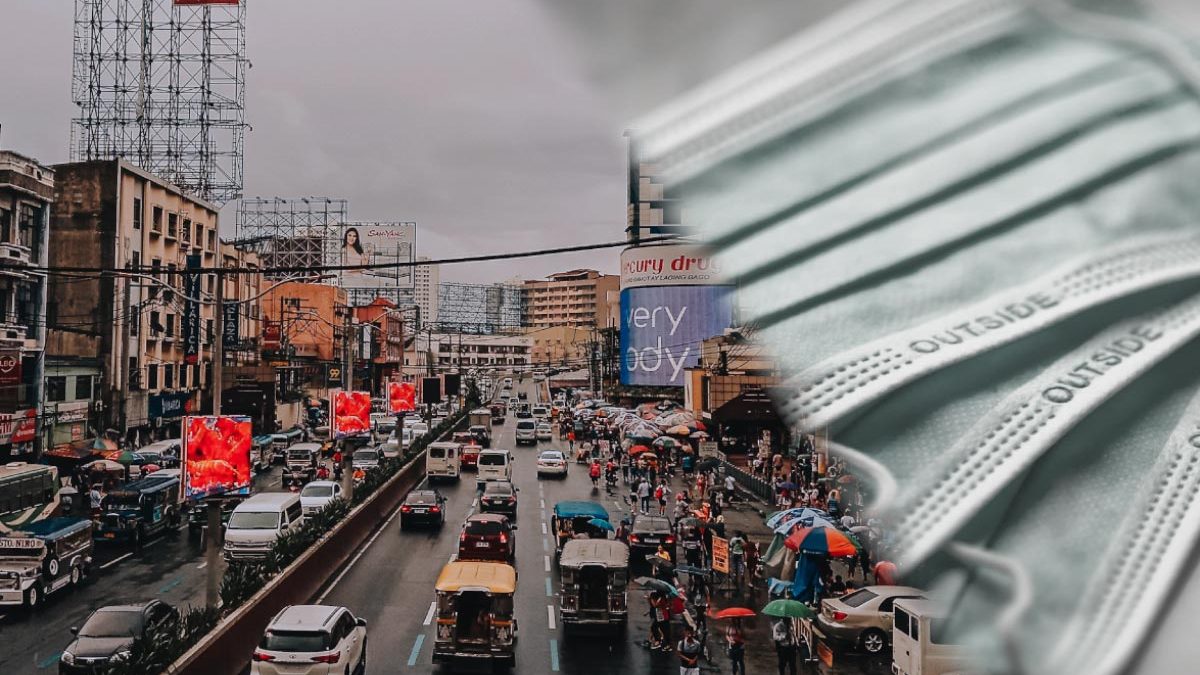
BE GUIDED ACCORDINGLY
July 2, 2020
Are Zoom and Tiktok safe?
July 2, 2020AN ECONOMY FOR THE PEOPLE: PH In The New Normal

Of all the many things I thought I’d experience in this lifetime, a pandemic was not one of them. I’m sure this is true for many of us. This global health crisis has put all of our lives on hold and claimed the better half of our year thus far; none of us ever saw it coming. Much has been said about the government’s handling of this delicate situation, and the country is torn between two opposing forces: the diehard supporters, and the diehard ousters. However, as an activist icon, Marie Dinglasan has said, “Kayumanggi ako.” We should only belong to one side and that is the Filipino’s.
In an exclusive interview with Mr. Marc Rivera, a graduate of the University of the Philippines with a degree in Bachelor of Arts Major in Social Sciences and Master of Arts in Sociology and now a professor in Holy Angel University, we explored the socioeconomic impacts of the pandemic to the country as well as some possible solutions.
WHO BEARS THE BRUNT
It may come as no surprise to you that many have, and will, lose their jobs during this pandemic. Mr. Rivera anticipates an increasingly upward trajectory when it comes to unemployment, a challenge we have been facing year after year. “Unemployment is just a symptom of a major problem,” he said, continuing on to explain that when there is unemployment, other problems arise such as hunger and domestic violence. These are things that must be dissected further to understand the root cause and the amplifying factors that lead to crimes and violent tendencies. The economics professor also shared his belief, saying “In every disaster, the poor is actually the sector that is most affected. The poor bears the brunt of a disaster.”
INSTITUTIONAL REFLECTION AND REDESIGNING
When asked what the government should focus on achieving after this pandemic, Mr. Rivera stated that we should not only be relying on the government to help the country recover and that civil organizations as well as the private sector would have to take part in generating solutions. “I think it’s very important that our private sector, the public sector, and the government have a round-table discussion to talk about this.”
As we transition to living in the New Normal, we must ensure that our policies make for a better society to live in. “This pandemic actually opens the floodgates for institutional reflection and redesigning,” said the UP graduate, providing a small glimpse into a paper he is writing. “The best thing we can do is to revisit our institutions, and to reflect on what are the things that we have missed, and that we have to confront still, and we have to propose a redesign,” he continued.
The pandemic’s impact on the education sector was discussed as a relevant example of this, with issues concerning the accessibility of education to all, particularly to the poor. With companies laying off workers, and families going hungry every day, most struggling parents would opt to feed their children rather than use the money to invest in gadgets and internet connection. In the midst of this fight for survival, education simply becomes an expense they cannot stretch their budgets for. Education becomes a luxury, a privilege rather than a right. Mr. Rivera urged for more attention on this, saying “We have to reflect on this, like what are the opportunities that we can give to the poor?”
DECONGESTION
Executive Order 114, or otherwise known as the Balik Probinsya Program entails addressing the congestion experienced in Metro Manila today by encouraging people to return home to their provinces and providing them with whatever assistance they need to transition. Mr. Rivera commented on this, stating that this is something our country needs, and should have been done long ago. However, he brought up the question of readiness among the provinces to accommodate the arrival of all these workers.
More than that, he explained that many of those who brave the move from rural to urban areas actually do it to settle in the cities for good. They are what we refer to as ‘internally displaced’ for reasons such as war, or the lack of opportunities in the rural areas. He also added that a viable solution to congestion in the urban areas should not just be about providing opportunities to people in the rural areas, but also making sure that the rural areas are safe spaces for people to live in. However, the pandemic gives rise to many challenges in accomplishing this, which according to Mr. Rivera, is another concern that must be revisited as we redesign our institutions.
CONCERNING DISPARITIES
Mr. Rivera explained that another impact this pandemic will have on society is that it will highlight our inequalities. This agrees with what author and poet Damian Barr has expressed, “We are in the same storm, but not in the same boat.” As the quarantine and dwindling economy take more and more jobs every day, people are pushed to resort to desperate measures just for survival. Some people, that is. For others, this is simply a storm to wait out in the comforts of their home. A startling realization this one is, but the truth is that there have always been inequalities in our society, but their extent sadly only came to glaring light when push came to shove. Perhaps this pandemic is the shove we need to realize how privileged some of us are.
In response to the age-old question of how we could address these inequalities, Mr. Rivera stated that we have to revisit the existing inequalities in our society: those between men and women, the older and younger generations, as well as those that separate the rich and the poor. “The best thing that we can do is to provide opportunities for all,” he said, emphasizing that doing so should not only be a one-time, big-time thing. Perhaps, this could be part of the New Normal that we have the opportunity to mold today.
THE RISE OF AN ONLINE ECONOMY
In light of the increasing rate of unemployment in our country, the Filipino grit has shown itself once more. Entrepreneurs are sprouting everywhere, making use of the internet to sell whatever they could. You can easily find a dozen muffins or an affordable outfit just by scrolling through your news feed. This is the band-aid solution many Filipinos have resorted to so they could serve something, anything, on their dining tables every day.
However, not all businesses can transition to the virtual world. I’d imagine that gown rentals are having a much trickier time adapting than those businesses in the Food and Beverage industry, especially now that mass gatherings are (a) not allowed, or (b) if allowed, not a priority in the family budget. These small and medium enterprises are among those that will truly struggle to cope with this pandemic.
According to Mr. Rivera, businesses are like organisms that must not only deal with competition, but also the changing environment in which they exist. “Innovation and creativity are the backbones of entrepreneurship,” he stated. Failure to adapt will most likely result in closure. After all, it’s a matter of survival of the fittest even in the business world.
SHADOW ECONOMIC ACTIVITIES
The Social Sciences graduate referred to prostitution and the drug cartel as an open secret; two of the numerous shadow economic activities that are present in our society. These activities have a bearing on the state, generating social issues without contributing taxes for betterment expenditures. Rather than shame them, he implored us to reflect on why these exist in the first place. “Primarily because the government cannot accommodate this number of population by giving them job opportunities,” he said, explaining that people often do not have access to what are deemed as ‘decent’ jobs, and would instead resort to illegal activities.
Mr. Rivera discussed that these shadow economic activities will tend to increase, due to the pandemic creating job uncertainties for so many people.
DEMOCRACY: THE ART OF THE POSSIBLE
”The best thing we can do is to properly utilize our limited space online. So be part of the discussion,” the Economics professor expressed when asked what we could do as laypersons to help rebuild our country during and after this pandemic, urging people to participate in online discussions. He continued on to say that if speaking out online is the only means we have to share our sentiments on what is happening in our society, then we must use our resources properly.
I wanted to know if, in his opinion, the online rallies being done were doing anything at all. Mr. Rivera simply said, “We just have to believe in the process of democracy, because democracy is the art of the possible.” What is important, after all, is that we do not keep mum. We must learn to stand up for what is right for our country.
However, he reminds us that no matter how effective our online platforms seem to be in voicing out our opinions, we still have to go outside at some point and venture the limited space that we have offline. “Clicktivism is not the be all end all. It’s not the panacea. It’s not the solution,” he continued, explaining that it’s just one of the things that we can do especially in the context of this pandemic.
This global health crisis that has plagued our nation is far from being over. With that said, we need to have a united front with only one goal in mind: the survival of each and every Filipino. These socio-economic impacts must be dissected so that we can aid those who have become victims of abuse and inequality. Our social and economic policies must revolve around the goal of creating a better society to live in. Our laws and regulations must always be for the good of the people. No one must be left behind.
LAYOUT BY: Chester P. Cortez
PHOTO SOURCE(S): Mika Baumeister, Marfil Aquino, Unsplash


